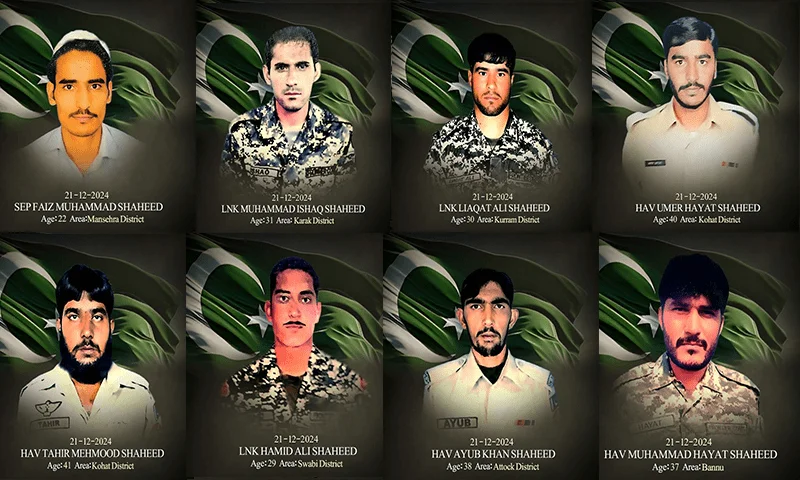16 soldiers were martyred on Saturday when terrorists attacked a checkpost in Makeen in Khyber Pakhtunkhwa’s South Waziristan district, the military’s media wing said in a statement.


After the banned Tehreek-i-Taliban Pakistan (TTP) broke a fragile ceasefire agreement with the government in 2022, the country witnessed a sharp uptick in the number of attacks targeting security forces and other law enforcement agencies, particularly in Balochistan and KP.
According to the interior ministry, in the past 10 months, 948 out of 1,566 terrorism incidents reported occurred in KP, resulting in 583 deaths (out of a total of 924 martyrdom).
The Inter-Services Public Relations (ISPR) said in its statement, issued in the late hours of Saturday, that on Friday night, “a group of khwarij attempted to attack a security forces checkpost in general area Makeen, South Waziristan District”.
According to the statement, the attack was repelled and eight terrorists were “sent to hell”. However, 16 soldiers were martyred while responding to the assault.
The statement added that a sanitisation operation was being conducted in the area and that “the perpetrators of the heinous act will be brought to justice”.
“Security forces of Pakistan are determined to eliminate the menace of terrorism and such sacrifices of our brave men further strengthen our resolve,” said the ISPR.
Soldier martyred as infiltration attempt thwarted in Khyber
One soldier was martyred while four terrorists were killed as security forces engaged a group of terrorists trying to infiltrate through the Pakistan-Afghanistan border in Khyber Pakhtunkhwa’s Khyber district, the ISPR said in a separate statement issued earlier.
![A picture of Sepoy Amir Sohail Afridi, who was martyred as forces thwarted an infiltration attempt by terrorists. [ISPR]](https://southasiatimes.org/wp-content/uploads/2024/12/211732170a35b35.webp)
In the statement, the military’s media wing said: “On night [of] 19/20 December, movement of a group of khwarij, trying to infiltrate through Pakistan-Afghanistan border, was picked up by the security forces in general area Rajgal, Khyber District.
“Troops effectively engaged and thwarted their attempt to infiltrate. Resultantly, four khwarij were sent to hell,” the ISPR added.
However, during the intense fire exchange, 22-year-old Sepoy Amir Sohail Afridi, a resident of Khyber District, “having fought gallantly, embraced shahadat (martyrdom)”.
The statement said that Pakistan has consistently been asking the Interim Afghan Government to ensure effective border management on their side of the border.
“Interim Afghan Government is expected to fulfil its obligations and deny the use of Afghan soil by khwarij for perpetuating acts of terrorism against Pakistan,” it added.
“The security forces of Pakistan remain committed to securing its borders and eliminating the menace of terrorism, and such sacrifices of our brave soldiers further strengthen our resolve,” the statement by ISPR concluded.
In July, the government designated the TTP as Fitna al Khawarij, while mandating all institutions to use the term khariji (outcast) when referring to the perpetrators of terrorist attacks on Pakistan.
On Wednesday, the ISPR had said that security forces killed 11 terrorists in three separate operations carried out across KP.
Earlier this month, a total of 43 terrorists — 18 in KP and 25 in Balochistan — were killed by security forces during extensive operations conducted in the provinces since Dec 9, causing a “major setback” to the TTP and other terrorist groups operating in Balochistan.
This news is sourced from Dawn and is intended for informational purposes only.

![16 soldiers martyred in terrorist attack on a checkpost in South Waziristan, KP, as security forces fight back [Image via Anadolu Ajansi/File]](https://southasiatimes.org/wp-content/uploads/2024/12/thumbs_b_c_f2013da1f611e3c9bfa0c715b4d8ac23.webp)

![Afghan men search for victims after a Pakistani air strike hit a residential area in the Girdi Kas village, Nangarhar province on February 22, 2026. [Aimal Zahir/AFP/Getty Images]](https://southasiatimes.org/wp-content/uploads/2026/02/gettyimages-2262391441.webp)


